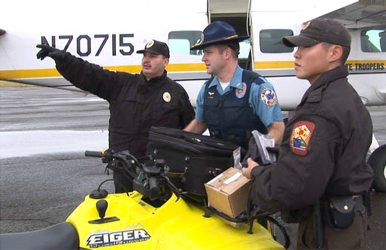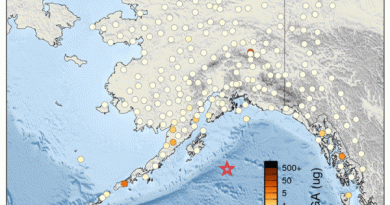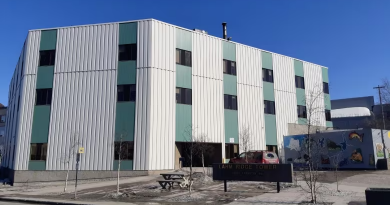Does Alaska’s Rural Justice commission have a future?
 An agency that has fought to improve life in rural Alaska might get new life itself if Senator Lisa Murkowski has her way.
An agency that has fought to improve life in rural Alaska might get new life itself if Senator Lisa Murkowski has her way.
The Alaska Rural Justice and Law Enforcement Commission has slipped out of the public eye in recent years and run out of money. But supporters say the panel should live on. It’s played a key role in empowering village peace officers and strengthening laws to combat alcohol abuse, long considered a fuel for misery in the Bush. But there’s still work to do.
The group has made a difference, said Dan Harrelson, a village public safety officer for more than two decades in the Northwest Alaska village of White Mountain.
Gone are the days when that rural force, “the first responders in the Last Frontier,” patrolled towns with little training and crude weapons. Today, they’re armed with Tasers and radios. They’re better prepared and better paid. And there’s a lot more of them — their numbers have doubled to about 100 in four years as the state, led by Gov. Sean Parnell, has boosted funding for the program.
“In the early ’80s, you had a pair of handcuffs and a wooden baton, and it was, ‘Go forth and fight crime my child,'” said Harrelson, the second-longest serving VPSO. “The pay wasn’t enough to feed your family. Now, it’s not a bad career path.”
Not that life as a village cop is easy. Harrelson’s wife, Luann, often serves as voluntary dispatcher because most people needing help in the village of 200 call his home rather than his tiny office. She’s a counselor, too, when a domestic-violence victim takes temporary shelter in their home.
Meantime, Harrelson’s office and its holding cell lack running water and flush toilets. Prisoners get coffee cans for toilets. And they aren’t easily cleaned up when they’re pepper-sprayed.
“It’s pretty hard on the prisoners when you have to haul in buckets of water to wash their face off,” Harrelson said.
He believes the panel should keep working. Village Public Safety Officers are certified peace officers, but he’d like to see them credentialed as police by the Alaska Police Standards Council. Credentialing would encourage more rural residents to serve as VPSOs. In addition, it would open up career options such as transferring to police forces in big cities or joining the ranks of the Alaska State Troopers, often based in the largest rural communities.
“Some people say, ‘You’re not really a cop.’ Well, I’m in the mud, investigating crimes, just like other police,” he said.
Big issues to tackle
The Alaska Rural Justice and Law Enforcement Commission with its powerful co-chairs — Alaska’s U.S. attorney and the state attorney general — has focused on more than peace officers and fighting alcohol.
The 10-member panel was created by Sen. Ted Stevens and Congress in 2004, to find solutions to such things as the lack of police and judicial services in more than 200 rural Alaska communities, and the high rates of family violence and bootlegging in those communities, many of which are dry.
Early on, the panel toured the state listening to residents in more than a dozen communities, many of them in the Bush. They heard horror stories about villages reeling from crime but with few resources to respond. Child abuse, suicides and sexual assault were all too common, but some villages lacked local officers and waited hours, sometimes days, for troopers to fly in and restore peace.
In many ways, little has changed. Rural prosecutors still face mountainous caseloads. Only a few Bush communities have shelters for abused woman and children. Treatment efforts and mental health services to stop the cycle are rare.
In sparsely populated Western Alaska, the state’s most widespread trooper detachment extends hundreds of miles from Kodiak Island in the south to the Arctic tundra in Northwest Alaska, an area larger than California. The region is home to an outsized portion of trooper cases involving assaults, sexual assaults and sexual abuse of a minor. Bursts of suicides also continue to flare up with alarming frequency, blowing into one area of Western Alaska for a spell before moving onto the next.
The panel may have done its most influential work in its first years. In 2006, it issued what it called an initial report, proposing numerous solutions that led to improvements. It played an important role by bringing together leaders with the power to change the justice system.
“We were a catalyst,” said Jim Torgerson, an Anchorage attorney and a longtime commissioner.
In addition to the improvements seen by VPSOs, state troopers now have additional powers to intercept illegal alcohol shipments into damp and dry communities. Bootlegging penalties are tougher. Oversight of alcohol shipments to rural Alaska is better, with a statewide database monitoring orders. And troopers have a greater presence in villages with new posts, including a recent opening in the Northwest village of Selawik.
Twenty years ago, Harrelson said troopers used to visit White Mountain from their Nome post a couple of times a year, usually to respond to a crime. Now they fly in twice a month to the Inupiat village of 200, often just to be visible.
The panel, on the other hand, has largely gone silent. Its last big public event may have been in 2008, during an Anchorage meeting to take public testimony on domestic violence. In a different event in Girdwood last summer that didn’t make headlines, the group brought together lawmakers, safety officials and others for a three-day seminar to discuss rural justice.
In 2010, Congress failed to approve a $275,000 earmark request for the panel, which has received less than $1 million during its life. Now, the group is broke.
It should be reauthorized, because there are still plenty of improvements to be made in rural Alaska, Torgerson said.
“I really hope we’ll have the resources to carry on this work,” he said.
New life?
Experts in the field have different hopes for the panel’s future, if it has one.
Walt Monegan, a former panelist who now heads the Alaska Native Justice Center, which serves as the pass-through agency for the group’s funding, said he’d like to see it work to empower tribal courts with better training and the ability to enforce state laws in remote areas.
“I would dearly like to see (the panel) re-funded because there’s a lot of work to be done yet,” said Monegan, who grew up in the rural village of Nyac.
Stephen Conn, former professor of justice at the University of Alaska Anchorage, said he’d like to see rural peace officers credentialed as real police. They should be given guns, additional training and the ability to investigate and prosecute major crimes with state assistance. A rotating police force could serve clusters of villages, and provide back-up in under-manned areas.
“They need to be brought up to the status of real police,” he said.
Senator Murkowski believes the group can continue helping build collaboration between the state and tribal courts. The state is working more closely with tribes these days, but some of the state’s concessions have came under the force of litigation. The state, refusing to recognize the power of tribal courts in the past, had balked at doing such thing as issuing new birth certificates in child-adoption cases approved by tribal courts. The state also refused to garnish Permanent Fund Dividends to assist tribal courts trying to force deadbeat parents to pay child support.
“The commission can continue to be a forum to promote better state and tribal collaboration,” Murkowski said. “That’s a better way to solve problems than the legal standoffs we’ve seen.”
She recently added a provision to the Violence Against Women Reauthorization Act, which she co-sponsored, calling for U.S. Attorney General Eric Holder to consult with state officials, the Alaska Federation of Natives and tribes and report to Congress within a year on whether additional funding should continue.
She cited one example of collaboration fostered by the panel. It recommended that troopers be deputized as U.S. Postal Service inspectors, a unique power that has helped investigators sniff out alcohol and drugs shipped by mail.
“It’s one example where collaboration made a difference,” Murkowski said.
The state also has supported continued funding for the panel. In a 2010 letter to the state’s U.S. senators, former Att. Gen. Dan Sullivan, now the state Commissioner of Natural Resources, said the panel is the only group fostering joint, high-level policy discussions on issues such as fighting domestic violence and enhancing law enforcement in rural Alaska.
If the Violence Against Women Reauthorization Act passes, Murkowski said she’s hoping the work conducted by the Justice Department will lead to a presidential appropriation — a different method than the 2010 earmark approach. But that money likely wouldn’t be available until at least next year, after the president’s 2014 budget is released in the spring.
Until then, the panel, which last met by conference call in December, hopes to keep rural issues in the limelight. It’s close to debuting a revamped web site. And though not required to do so, it plans to issue a final report with additional suggestions on improving Bush justice.
Of course, the panel would like to call it an updated report, in hopes that Congress will give the group new life, Torgerson said.
Contact Alex DeMarban at alex(at)alaskadispatch.com
For more stories from Alaska Dispatch, click here.



